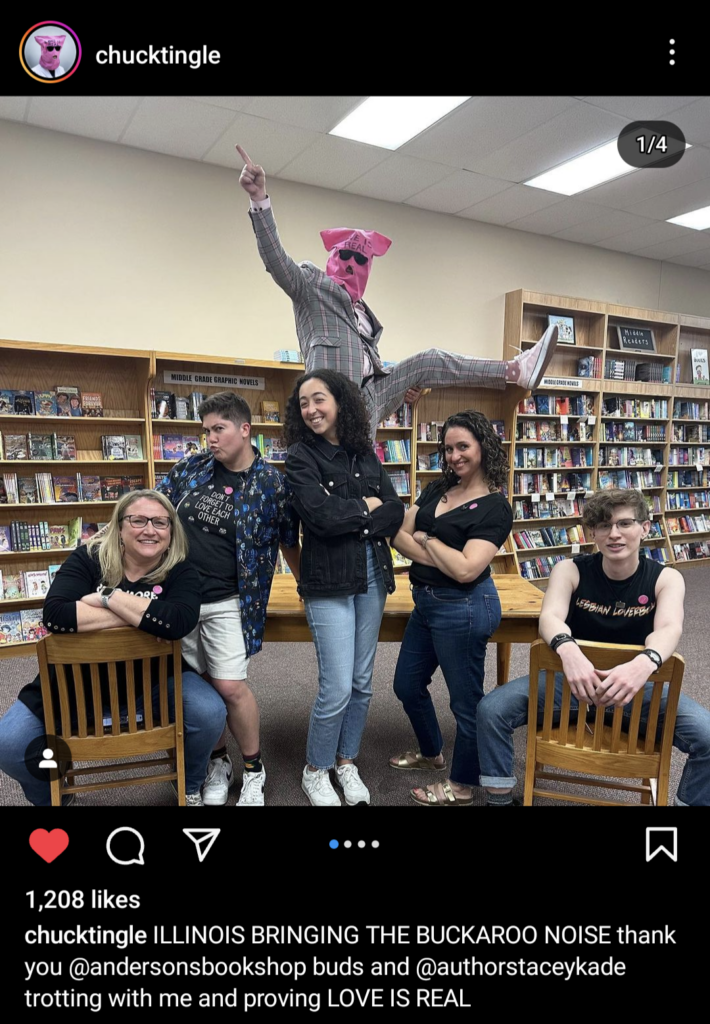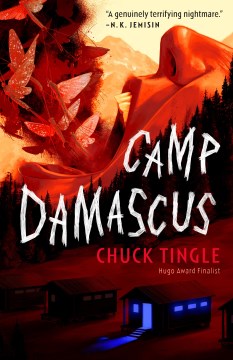Camp Damascus by Chuck Tingle
Genres: Horror
First Released: 2023
Part of a Series: No
Call Number: FICTION TINGLE
Eyan’s Rating: 4.75/5
For Fans of: Grady Hendrix; Manhunt by Gretchen Felker-Martin; Dead Space by S.A. Barnes
Summary
From beloved internet icon Chuck Tingle, Camp Damascus is a searing and earnest horror debut about the demons the queer community face in America, the price of keeping secrets and finding the courage to burn it all down. Welcome to Neverton, Montana: home to a God-fearing community with a heart of gold. Nestled high up in the mountains is Camp Damascus, the self-proclaimed “most effective” gay conversion camp in the country. Here, a life free from sin awaits. But the secret behind that success is anything but holy. And it’ll scare you straight to hell.
Eyan’s Review
Over the past decade, Chuck Tingle has made a name for himself as the eponymous author and creator of self-published LGBTQIA+ inclusive erotica, often with a satirical twist. By acknowledging and embracing common erotica conventions as well as social expectations for what love should look like, Tingle has amassed a large fanbase affectionately referred to by the author as “Buckaroos.” Tingle is as much a fictional creation as any of his written characters; he never appears in public unmasked, adopts a distinct ‘speaking’ voice in online engagements and interviews (I particularly enjoyed this June ’23 interview from Tor.com), and little is generally known about the man behind the pink sack.

Chuck Tingle formal author photograph
With this history behind him, Chuck Tingle’s first full-length physically published novel, Camp Damascus, ventures into a new genre: horror. When I reviewed Dead Silence by S. A. Barnes earlier this year, I particularly noted the distinction between psychological and supernatural horror. I emphasized that Barnes’ novel manipulated psychological conventions, leaving questions of the supernatural to the fringes. I think Damascus is similar in that, while there are certainly supernatural elements involved throughout the book, the bone-chilling dread that comes from Tingle’s pages is not the horror of demonic intervention; rather, the very real and lived experiential horror of being someone different in an insular environment.
There are so many layers to Camp Damascus that, at first, the fairly sparse prose feels misleading; however, as the protagonist Rose uncovers more truths about herself and the world around her, the crisp composition and intentional use of language mirrors not only the way Rose herself views the world as an autistic adult, but the common ways in which language is used to cause harm through the guise of kind assistance.
The novel opens with Rose participating in a traditional teen summer activity: cliff diving. The entire first handful of chapters introduces Rose and her world to readers. We meet her friends and her parents, and we learn the incredibly unexpected revelation that she is a twenty-year-old high school senior, having been held back at significant times in her educational career because of her family’s involvement in the Kingdom of Pines Church community. The juxtaposition of her age is very intentional; as an adult, Rose should be making decisions for herself. Instead, it is clear that her parents are withholding vital truths. When she begins to see what she thinks is a demon, she starts to question those truths.
Rose’s experiences growing up in this insular community don’t exactly match my own. I did grow up in a religious area, however, and many of the pressures, conventions and entire conversations in the book mirrored my own experiences. The horror I began to feel while reading Camp Damascus was not because of the apparition seemingly stalking Rose, but in the way that Rose was clearly being suppressed by the people who claimed to love her. My horror was stemming from the shared trauma of suppressing my own queer identity.
Ultimately, Rose’s journey is one of personal acceptance and the outward assertion of that identity. Language plays a vital role in this experience, for Rose and the reader. It is language that is used to manipulate Rose into complacency, from the tenets she follows to the assertions of care given to her. One of the first ways I noticed this was in the deliberate separation between Rose’s parents as “mom” and “dad” versus her parents as “Lisa” and “Luke.” When her parents are acting parental, they’re mom and dad, and the moment is usually paired with a normal parent-child scenario. However, even from the very beginning, their proper names slip into Rose’s thoughts during moments of tension or separation from her identity. These are moments when it becomes clear they don’t see Rose, but rather a stand-in for the daughter they think they should have.
For example, after a somewhat traumatizing event happens to Rose early on, she asks her father:
“How’s Mom doing?” I ask, still concerned about her reaction to all the chaos. Lisa was really shaken up.
You would expect a parent to show concern for the child, but it is Lisa that Rose responds to, not a mother, not a caretaker. The more frequently Luke and Lisa’s names begin appearing in Rose’s thoughts, the more clear it is that she has begun to assert her own personhood. As Rose’s personhood challenges her parent’s perceptions of the daughter they think they have, she has to contend with the ways in which language has failed to protect her and has indeed been used to cause great harm. For many LGBTQIA+ individuals, the very act of living authentically challenges many strongly held beliefs and convictions in the people around us. For that reason, I’d like to share a quote from Camp Damascus where Rose realizes that to be truly herself, she’ll have to separate from people who do not and cannot see her for who she is.
Slowly disconnecting from your community—from your family—is difficult, and while it seems like unearthing their sinister motives and dark secrets might make the process easier, it will never entirely quell the pain. I’ve been avoiding this dark ache by keeping my mind busy while my body couldn’t be, but it hasn’t gone away. The sadness is still there, lurking in the corner like a pale demon in a red polo, just waiting to finally be acknowledged. That acknowledgment could arrive after several decades, or it could happen tonight, but the time will come. Eventually, I’ll have to fully contend with this simple fact: the love I was promised is conditional.
The role of conversion therapy likewise plays a major part in this novel and is perhaps the ultimate evil Tingle portrays. When Rose no longer conforms to her parents’ expectations, the means by which the adults in her life seek to silence her are horrifying in their subtlety and realism. Further, there are four tenets Rose is expected to adhere to as a member of her fringe religious group, the first of which is: “Respect—I will honor when I do not understand.” Rose is an intelligent and curious individual however, and her attempts to answer questions about the world around her, including those related to her personal health, are stymied as inappropriate behavior; as dishonoring the core aspect of faith which requires belief regardless and in spite of evidence.
Camp Damascus was a transgressive horror novel, and its horror was not in the supernatural or otherworldly elements, but the relatability and closely matched lived experiences shown in many of the moments throughout. And yet, the takeaway is one of hope and positivity: finding yourself is worth the cost. And, as Chuck Tingle himself says, love is real.

Tingle at a Camp Damascus signing with the employee’s of Anderson’s Booksellers in Naperville, August 2023.
Note: Many states have passed laws in recent years that protect LGBTQIA+ youth from the harmful practice of conversion therapy, but Utah, the setting for this novel and birthplace of Tingle, only ratified these protections under law this year. The Human Rights Campaign provides more information and statistics surrounding this practice.

